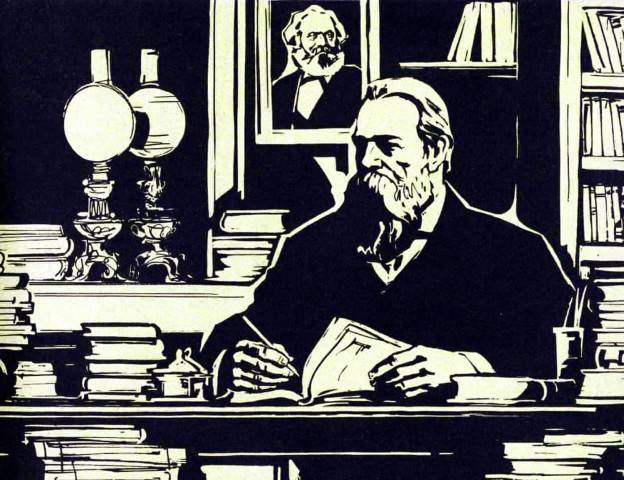
Towards the very end of his entertaining and sympathetic biography of Friedrich Engels, Tristram Hunt cites the comparison made by a Chinese scholar, Ching Kwan Lee, between the horrific working conditions in an 1840s’ Manchester cotton mill described by Engels and the factory experiences of a migrant worker in Shenzen 160 years later.
He then points to the irony “that such unleavened exploitation is actively sanctioned by the Communist Party of China.”
Engels’ description comes from The Condition of the Working Class in England, his seminal text. Engels, born 200 years ago on November 28 last year, it is hard to remember, was 24 years old when he wrote The Condition of the Working Class in England. He was exceptionally well qualified for the task. He came from a wealthy family of cotton manufacturers in Barmen, in the Rhineland, and one which had, moreover, been astute enough to establish a branch (Ermen & Engels) in the very centre of the economy of industrial capitalism, in Manchester itself. The young Engels, surrounded by the horrors of early industrial capitalism and reacting against the narrow and self-righteous pietism of his home, took the usual road of progressive young German intellectuals in the late 1830s. Like his slightly older contemporary Karl Marx he became a ‘lLft Hegelian’ – Hegel’s philosophy then dominated higher education in the Prussian capital, Berlin – leaned increasingly towards communism and began to contribute to various periodicals and publications in which the German left attempted to formulate its critique of society. Soon he considered himself a communist. It is not clear whether the decision to settle in England for a while was his or his father’s. Probably both favoured it for different reasons: old Engels in order to remove his revolutionary son from the agitation of Germany and turn him into a solid businessman, young Engels in order to be in the centre of modern capitalism and near the great movements of the British proletariat, which he already recognized as the crucial revolutionary force in the modern world.
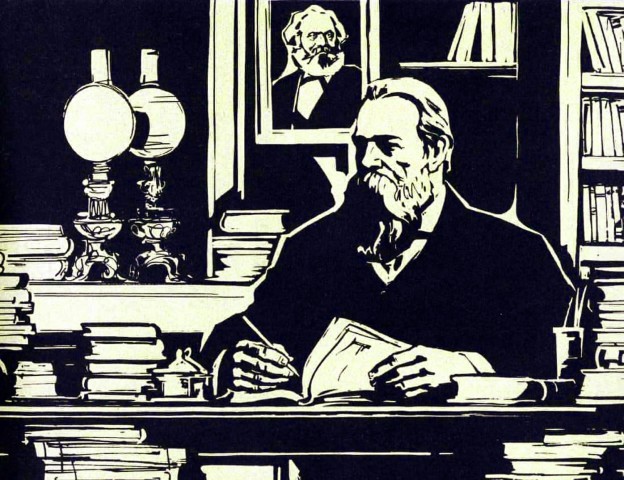
Engels left for England in the autumn of 1842, making his first personal contact with Marx on the way, and remained there for the better part of two years, observing, studying, and formulating his ideas. By the early months of 1844 he was certainly at work on the book, though most of the writing was done in the winter of 1844-45. The work appeared in its final form in Leipzig, in the summer of 1845, with a preface and dedication (in English) “to the working classes of Great Britain.” It was published in English, with slight revisions by the author but substantial prefaces in 1887 (American edition) and 1892 (British edition). It thus took the best part of a half-century for this masterpiece about early industrial England to reach the country which was its subject. Since then, however, it has been familiar to every student of the Industrial Revolution, if only by name.
The idea of writing a book about the condition of the labouring classes was not in itself original. By the 1830s it had become clear to every intelligent observer that the economically advanced parts of Europe faced a social problem which was no longer simply that of ‘the poor’ but of a historically unprecedented class, the proletariat. The 1830s and 1840s, a decisive period in the evolution of capitalism and the working-class movement, therefore saw books, pamphlets and inquiries into the condition of the working classes multiplying all over western Europe. Engels’ book is the most eminent piece of writing of this kind, though L. Villermé’s Tableau de l’Etat Physique et Moral des Ouvriers employés dans les Manufactures de Coton, de Laine et de Soie (Study of the Physical Condition of Cotton, Wool and Silk workers, 1840) deserves attention as a very distinguished piece of social investigation. It was also clear that the problem of the proletariat was not merely local or national, but international. Buret compared English and French conditions (La misère des classes laborieuses en France et en Angleterre, 1840) and Ducpétiaux compiled data on the conditions of young workers all over Europe in 1843. Engels’ book was therefore not an isolated literary phenomenon, a fact which has led anti-Marxists periodically to accuse him of plagiarism when unable to think of anything better.
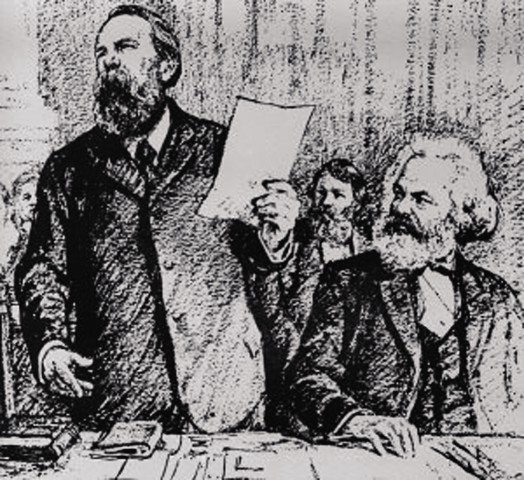
However, it differed from apparently similar contemporary works in several ways. Firstly it was, as Engels himself justly claimed, the first book in Britain or any other country which dealt with the working class as a whole and not merely with particular sections and industries. Secondly, and more important, it was not merely a survey of working-class conditions, but a general analysis of the evolution of industrial capitalism, of the social impact of industrialization and its political and social consequences – including the rise of the labour movement. In fact, it was the first large-scale attempt to apply the Marxist method to the concrete study of society, and probably the first work by either Marx or Engels which the founders of Marxism regarded as sufficiently valuable to merit permanent preservation. However, as Engels makes clear in the 1892 preface, his books did not yet represent a mature Marxism but rather ‘one of the phases of its embryonic development’. For the mature and fully formulated interpretation we must go to Marx’s Capital.
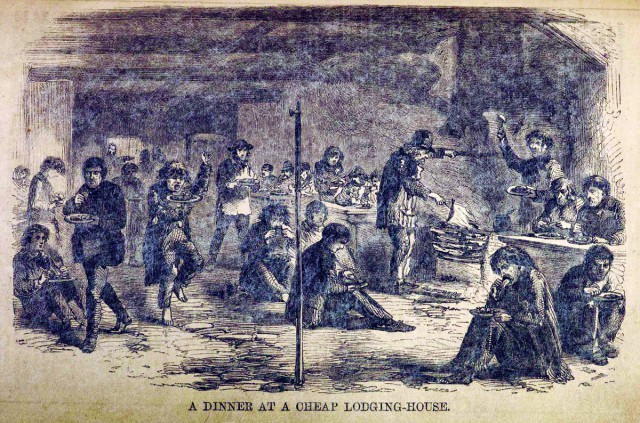
Argument and Analysis
The work begins with a brief sketch of that Industrial Revolution which transformed British society and created, as its chief product, the proletariat (chapters I-II). This is the first of Engels’ pioneering achievements, for the Condition is probably the earliest work whose analysis is systematically based on the concept of the Industrial Revolution, which was then novel and tentative, having only been invented in British and French socialist discussions during the 1820s. Engels’ historical account of this transformation lays no claim to historical originality. Though still useful, it has been superseded by later and fuller works.
Socially, Engels sees the transformations brought about by the Industrial Revolution as a gigantic process of concentration and polarization, whose tendency is to create a growing proletariat, an increasingly small bourgeoisie of increasingly large capitalists, both in an increasingly urbanized society. The rise of capitalist industrialism destroys the petty commodity producers, peasantry, and petty-bourgeoisie, and the decline of these intermediate strata, depriving the worker of the possibility of becoming a small master, confines him to the ranks of the proletariat which thus becomes “a definite class in the population, whereas it had only been a transitional stage towards entering into the middle classes.” The workers, therefore, develop class consciousness – the term itself is not used by Engels – and a labour movement. Here is another of Engels’ major achievements. In Lenin’s words “he was among the first to say that the proletariat is not only a class that suffers; that it is precisely its shameful economic situation which irresistibly drives it forward, and obliges it to struggle for its final emancipation.”
However, this process of concentration, polarization and urbanization is not fortuitous. Large-scale mechanized industry requires growing capital investments, its division of labour requires the accumulation of large number of proletarians. Such large units of production, even when built in the country-side, attract communities round them, which will produce a surplus labour force, so that wages fall and other industrialists are attracted. Thus industrial villages grow into cities which continue to expand, because of the economic advantages they provide for industrialists. Though industry will tend to migrate from the higher urban to the lower rural wages, this will in turn plant the seeds of urbanism in the countryside.
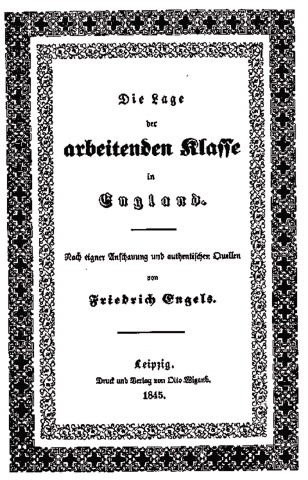
For Engels, the great cities are therefore the most typical locations of capitalism and he discusses them in chapter III. There unrestrained exploitation and competition appear in their most naked form: “everywhere barbarous indifference, hard selfishness on one side, unspeakable misery on the other, everywhere social war, every man’s house a fortress, everywhere marauders who plunder under the protection of the law.” In this anarchy those who own no means of life and production are defeated and reduced to labouring for a pittance or to starvation when unemployed. And what is worse, to a life of profound insecurity, in which the worker’s future is utterly unknown and unsettled. In fact, it is governed by the laws of capitalist competition which Engels discusses in chapter IV.
The workers’ wage fluctuates between a minimum subsistence rate – though this is not a rigid concept for Engels – which is set by the workers’ competition with one another but limited by their inability to work below subsistence, and a maximum, set by the competition of capitalists with one another in times of labour shortage The average wage is likely to be somewhat above the minimum: how much depends on the customary or acquired standard of living of the workers. But certain kinds of labour, notably in industry, require better qualified workers, and their average wage level is therefore higher than the rest, though part of this higher level also reflects the higher cost of living in the cities. (This higher urban and industrial wage level also helps to enlarge the working class by attracting rural and foreign – Irish – immigrants.) However, the competition between workers creates a permanent ‘surplus population’ – what Marx was later to call the industrial reserve army – which keeps down the standard of all.
This is so despite the expansion of the whole economy that arises from the cheapening of goods through technological progress, which increases demand and reabsorbs many of the workers it displaces into new industries, and from Britain’s industrial world monopoly. Hence population grows, production increases, and so does the demand for labour. Nevertheless, the ‘surplus population’ is kept in being because of the operation of the periodic cycle of prosperity and crisis, which Engels was one of the first to recognize as an integral part of capitalism, and for which he was one of the first to suggest a precise periodicity. The recognition of a reserve army as a permanently essential part of capitalism and of the trade cycle, represents two further important pieces of theoretical pioneering. Since capitalism operates through fluctuations, it must have a permanent reserve of workers, except at the very peak of the booms. The reserve is composed partly of proletarians, partly of potential proletarians – countrymen, Irish immigrants, people from economically less dynamic occupations.
What kind of working class does capitalism produce? What are its conditions of life, what sort of individual and collective behaviour do these material conditions create? Engels devotes the greater part of his book (chapters III, V-XI) to the description and analysis of these matters and in doing so produces his most mature contribution to social science, an analysis of the social impact of capitalist industrialization and urbanization which is still in many respects unsurpassed. It must be read and studied in detail. The argument can be briefly summarized as follows. Capitalism pitchforks the new proletariat, often composed of immigrants from pre-industrial backgrounds, into a social hell in which they are ground down, underpaid or starved, left to rot in slums, neglected, despised, and coerced, not only by the impersonal force of competition but by the bourgeoisie as a class, which regards them as objects and not as men, as ‘labour’ or ‘hands’ and not as human beings (chapter XII). The capitalist, supported by bourgeois law, imposes his factory discipline, fines them, causes them to be jailed, imposes his wishes on them at will. The bourgeoisie as a class discriminates against them, evolves the Malthusian population theory against them, and imposes on them the cruelties of the Malthusian ‘New Poor Law’ of 1834. However, this systematic dehumanization also keeps the workers out of the reach of bourgeois ideology and illusion – for instance of bourgeois egoism, religion and morality. Progressive industrialization and urbanization forces them to learn the lessons of their social situation and in concentrating them, makes them aware of their power. ‘The closer the workers are associated with industry the more advanced they are’. (However, Engels also observes the radicalizing effect of mass immigration, as among the Irish.)
The workers face their situation in different ways. Some succumb to it, allowing themselves to be demoralized: but the increase in drunkenness, vice, crime and irrational spending is a social phenomenon, the creation of capitalism, and not to be explained by the weakness and shiftlessness of individuals. Others submit passively to their fate and exist as best they can as respectable law-abiding citizens, take no interest in public affairs and thus actually help the middle class to tighten the chains which bind the workers. But real humanity and dignity are to be found only in the fight against the bourgeoisie, in the labour movement which the workers’ conditions invariably produce.
(to be continued)
Raza Naeem is a Pakistani social scientist, book critic and award-winning translator and dramatic reader, currently based in Lahore, where he is also the president of the Progressive Writers Association. He can be reached at: razanaeem@hotmail.com
He then points to the irony “that such unleavened exploitation is actively sanctioned by the Communist Party of China.”
Engels’ description comes from The Condition of the Working Class in England, his seminal text. Engels, born 200 years ago on November 28 last year, it is hard to remember, was 24 years old when he wrote The Condition of the Working Class in England. He was exceptionally well qualified for the task. He came from a wealthy family of cotton manufacturers in Barmen, in the Rhineland, and one which had, moreover, been astute enough to establish a branch (Ermen & Engels) in the very centre of the economy of industrial capitalism, in Manchester itself. The young Engels, surrounded by the horrors of early industrial capitalism and reacting against the narrow and self-righteous pietism of his home, took the usual road of progressive young German intellectuals in the late 1830s. Like his slightly older contemporary Karl Marx he became a ‘lLft Hegelian’ – Hegel’s philosophy then dominated higher education in the Prussian capital, Berlin – leaned increasingly towards communism and began to contribute to various periodicals and publications in which the German left attempted to formulate its critique of society. Soon he considered himself a communist. It is not clear whether the decision to settle in England for a while was his or his father’s. Probably both favoured it for different reasons: old Engels in order to remove his revolutionary son from the agitation of Germany and turn him into a solid businessman, young Engels in order to be in the centre of modern capitalism and near the great movements of the British proletariat, which he already recognized as the crucial revolutionary force in the modern world.

Engels left for England in the autumn of 1842, making his first personal contact with Marx on the way, and remained there for the better part of two years, observing, studying, and formulating his ideas. By the early months of 1844 he was certainly at work on the book, though most of the writing was done in the winter of 1844-45. The work appeared in its final form in Leipzig, in the summer of 1845, with a preface and dedication (in English) “to the working classes of Great Britain.” It was published in English, with slight revisions by the author but substantial prefaces in 1887 (American edition) and 1892 (British edition). It thus took the best part of a half-century for this masterpiece about early industrial England to reach the country which was its subject. Since then, however, it has been familiar to every student of the Industrial Revolution, if only by name.
The idea of writing a book about the condition of the labouring classes was not in itself original. By the 1830s it had become clear to every intelligent observer that the economically advanced parts of Europe faced a social problem which was no longer simply that of ‘the poor’ but of a historically unprecedented class, the proletariat. The 1830s and 1840s, a decisive period in the evolution of capitalism and the working-class movement, therefore saw books, pamphlets and inquiries into the condition of the working classes multiplying all over western Europe. Engels’ book is the most eminent piece of writing of this kind, though L. Villermé’s Tableau de l’Etat Physique et Moral des Ouvriers employés dans les Manufactures de Coton, de Laine et de Soie (Study of the Physical Condition of Cotton, Wool and Silk workers, 1840) deserves attention as a very distinguished piece of social investigation. It was also clear that the problem of the proletariat was not merely local or national, but international. Buret compared English and French conditions (La misère des classes laborieuses en France et en Angleterre, 1840) and Ducpétiaux compiled data on the conditions of young workers all over Europe in 1843. Engels’ book was therefore not an isolated literary phenomenon, a fact which has led anti-Marxists periodically to accuse him of plagiarism when unable to think of anything better.

However, it differed from apparently similar contemporary works in several ways. Firstly it was, as Engels himself justly claimed, the first book in Britain or any other country which dealt with the working class as a whole and not merely with particular sections and industries. Secondly, and more important, it was not merely a survey of working-class conditions, but a general analysis of the evolution of industrial capitalism, of the social impact of industrialization and its political and social consequences – including the rise of the labour movement. In fact, it was the first large-scale attempt to apply the Marxist method to the concrete study of society, and probably the first work by either Marx or Engels which the founders of Marxism regarded as sufficiently valuable to merit permanent preservation. However, as Engels makes clear in the 1892 preface, his books did not yet represent a mature Marxism but rather ‘one of the phases of its embryonic development’. For the mature and fully formulated interpretation we must go to Marx’s Capital.

Argument and Analysis
The work begins with a brief sketch of that Industrial Revolution which transformed British society and created, as its chief product, the proletariat (chapters I-II). This is the first of Engels’ pioneering achievements, for the Condition is probably the earliest work whose analysis is systematically based on the concept of the Industrial Revolution, which was then novel and tentative, having only been invented in British and French socialist discussions during the 1820s. Engels’ historical account of this transformation lays no claim to historical originality. Though still useful, it has been superseded by later and fuller works.
Socially, Engels sees the transformations brought about by the Industrial Revolution as a gigantic process of concentration and polarization, whose tendency is to create a growing proletariat, an increasingly small bourgeoisie of increasingly large capitalists, both in an increasingly urbanized society. The rise of capitalist industrialism destroys the petty commodity producers, peasantry, and petty-bourgeoisie, and the decline of these intermediate strata, depriving the worker of the possibility of becoming a small master, confines him to the ranks of the proletariat which thus becomes “a definite class in the population, whereas it had only been a transitional stage towards entering into the middle classes.” The workers, therefore, develop class consciousness – the term itself is not used by Engels – and a labour movement. Here is another of Engels’ major achievements. In Lenin’s words “he was among the first to say that the proletariat is not only a class that suffers; that it is precisely its shameful economic situation which irresistibly drives it forward, and obliges it to struggle for its final emancipation.”
However, this process of concentration, polarization and urbanization is not fortuitous. Large-scale mechanized industry requires growing capital investments, its division of labour requires the accumulation of large number of proletarians. Such large units of production, even when built in the country-side, attract communities round them, which will produce a surplus labour force, so that wages fall and other industrialists are attracted. Thus industrial villages grow into cities which continue to expand, because of the economic advantages they provide for industrialists. Though industry will tend to migrate from the higher urban to the lower rural wages, this will in turn plant the seeds of urbanism in the countryside.

For Engels, the great cities are therefore the most typical locations of capitalism and he discusses them in chapter III. There unrestrained exploitation and competition appear in their most naked form: “everywhere barbarous indifference, hard selfishness on one side, unspeakable misery on the other, everywhere social war, every man’s house a fortress, everywhere marauders who plunder under the protection of the law.” In this anarchy those who own no means of life and production are defeated and reduced to labouring for a pittance or to starvation when unemployed. And what is worse, to a life of profound insecurity, in which the worker’s future is utterly unknown and unsettled. In fact, it is governed by the laws of capitalist competition which Engels discusses in chapter IV.
The workers’ wage fluctuates between a minimum subsistence rate – though this is not a rigid concept for Engels – which is set by the workers’ competition with one another but limited by their inability to work below subsistence, and a maximum, set by the competition of capitalists with one another in times of labour shortage The average wage is likely to be somewhat above the minimum: how much depends on the customary or acquired standard of living of the workers. But certain kinds of labour, notably in industry, require better qualified workers, and their average wage level is therefore higher than the rest, though part of this higher level also reflects the higher cost of living in the cities. (This higher urban and industrial wage level also helps to enlarge the working class by attracting rural and foreign – Irish – immigrants.) However, the competition between workers creates a permanent ‘surplus population’ – what Marx was later to call the industrial reserve army – which keeps down the standard of all.
This is so despite the expansion of the whole economy that arises from the cheapening of goods through technological progress, which increases demand and reabsorbs many of the workers it displaces into new industries, and from Britain’s industrial world monopoly. Hence population grows, production increases, and so does the demand for labour. Nevertheless, the ‘surplus population’ is kept in being because of the operation of the periodic cycle of prosperity and crisis, which Engels was one of the first to recognize as an integral part of capitalism, and for which he was one of the first to suggest a precise periodicity. The recognition of a reserve army as a permanently essential part of capitalism and of the trade cycle, represents two further important pieces of theoretical pioneering. Since capitalism operates through fluctuations, it must have a permanent reserve of workers, except at the very peak of the booms. The reserve is composed partly of proletarians, partly of potential proletarians – countrymen, Irish immigrants, people from economically less dynamic occupations.
What kind of working class does capitalism produce? What are its conditions of life, what sort of individual and collective behaviour do these material conditions create? Engels devotes the greater part of his book (chapters III, V-XI) to the description and analysis of these matters and in doing so produces his most mature contribution to social science, an analysis of the social impact of capitalist industrialization and urbanization which is still in many respects unsurpassed. It must be read and studied in detail. The argument can be briefly summarized as follows. Capitalism pitchforks the new proletariat, often composed of immigrants from pre-industrial backgrounds, into a social hell in which they are ground down, underpaid or starved, left to rot in slums, neglected, despised, and coerced, not only by the impersonal force of competition but by the bourgeoisie as a class, which regards them as objects and not as men, as ‘labour’ or ‘hands’ and not as human beings (chapter XII). The capitalist, supported by bourgeois law, imposes his factory discipline, fines them, causes them to be jailed, imposes his wishes on them at will. The bourgeoisie as a class discriminates against them, evolves the Malthusian population theory against them, and imposes on them the cruelties of the Malthusian ‘New Poor Law’ of 1834. However, this systematic dehumanization also keeps the workers out of the reach of bourgeois ideology and illusion – for instance of bourgeois egoism, religion and morality. Progressive industrialization and urbanization forces them to learn the lessons of their social situation and in concentrating them, makes them aware of their power. ‘The closer the workers are associated with industry the more advanced they are’. (However, Engels also observes the radicalizing effect of mass immigration, as among the Irish.)
The workers face their situation in different ways. Some succumb to it, allowing themselves to be demoralized: but the increase in drunkenness, vice, crime and irrational spending is a social phenomenon, the creation of capitalism, and not to be explained by the weakness and shiftlessness of individuals. Others submit passively to their fate and exist as best they can as respectable law-abiding citizens, take no interest in public affairs and thus actually help the middle class to tighten the chains which bind the workers. But real humanity and dignity are to be found only in the fight against the bourgeoisie, in the labour movement which the workers’ conditions invariably produce.
(to be continued)
Raza Naeem is a Pakistani social scientist, book critic and award-winning translator and dramatic reader, currently based in Lahore, where he is also the president of the Progressive Writers Association. He can be reached at: razanaeem@hotmail.com

